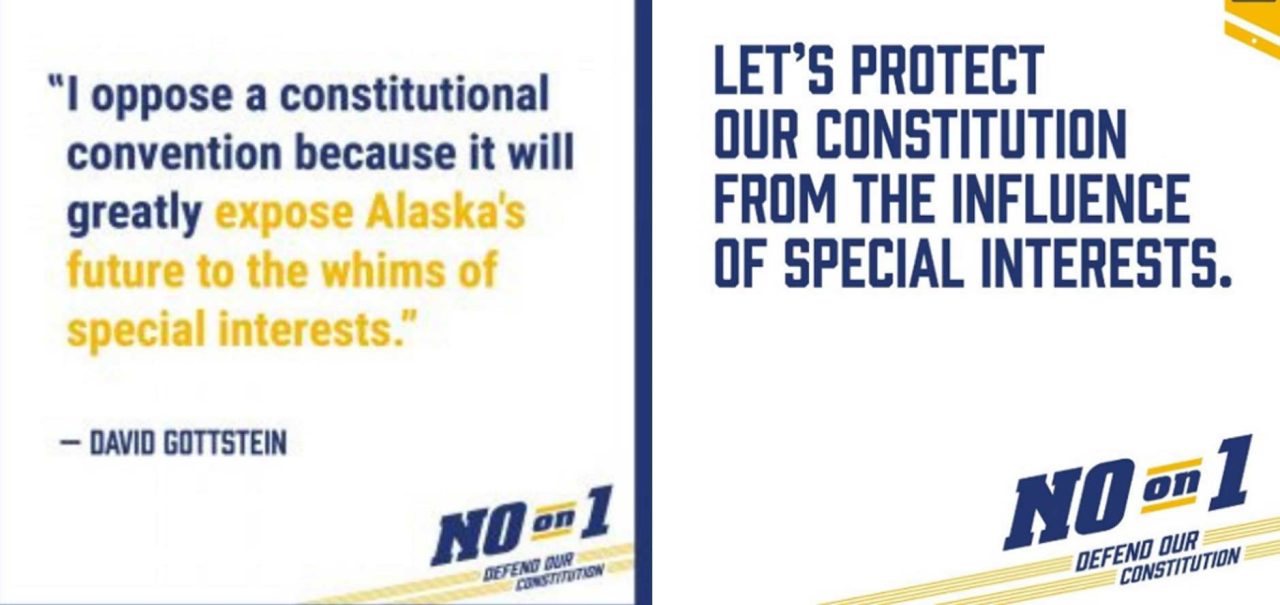
By J.H. Snider – The Fulcrum
Editor’s note: The following is part three of four in a series about Alaska’s 2022 Constitutional Convention vote, which included massive amounts of outside spending to convince Alaskans to vote against holding a constitutional convention. Read parts one and two here.
Alaska’s constitutional convention spending spree illustrates the failure of America’s one-size-fits-all campaign finance legal regime for ballot measures, which is based on disclosure. Let us call the current regime “The Marketplace of Ideas Regime” or MOIR, for short. MOIR’s premise is that there is a viable marketplace of ideas so that disclosure of campaign contributors will meaningfully rein in the harmful democratic effects of entrenched economic power.
In recent decades, the track record of convention referendums illustrates that, as in Alaska, campaign finance disclosure for convention referendums may suffer from extreme, systemic collective action problems leading to MOIR failure. On the one hand, bipartisan groups of America’s most powerful special interest groups in conjunction with state legislatures can form a cartel to preserve their veto power over constitutional reforms. On the other hand, those seeking democratic reforms that are popular, but the legislature won’t pass appear to suffer from severe collective action problems.
The Normative Framework Endorsed by Defend Our Democracy
Defend Our Constitution alleged that special, out-of-state, and dark money interests would have excessive influence over the convention process, including its second and third stages: the election of convention delegates, and the public’s voting up or down each convention-proposed constitutional amendment. For example, its website FAQ stated: “A convention would bring an unprecedented amount of outside special interest groups and dark money to change Alaska’s laws to promote their own agendas.” With more chutzpah, one of its debaters wrote: “outside interests are pouring millions in unlimited dark money into an effort to turn Alaska into a civic guinea pig. They want to shred and rewrite Alaska’s founding document and start over again with a boot on the neck of your personal privacy, natural resources, Permanent Fund dividend, schools, the judiciary, civil rights and liberties.” Dozens of social media posts focused on the special interest danger, including these two:

Defend Our Constitution used such arguments to attack the convention process because disproportionate influence by any interest group is politically unpopular, as it violates the core democratic principle of political equality. Indeed, the democratic rationale for campaign finance disclosure is to alert the public to such disproportionate influence. Accordingly, Defend Our Constitution never promoted its own group contributors and fundraising advantage in its advertising and free media campaigns. Nor did it explain why, if a convention would be so helpful to such groups, ConventionYes!, unlike Defend Our Constitution, failed to receive money from them. Nor did it publicize ConventionYes!’s funding sources, presumably because ConventionYes! only received funding from individuals in relatively small amounts – a much more popular type of funding than what it received.
Defend Our Constitution’s arguments were hypocritical. But that’s not an objection to MOIR theory, which only requires that ConventionYes! have an incentive to counter the Defend Our Constitution information. Since ConventionYes! had virtually no money for paid advertising, this meant that it would have to rely on free media to publicize these campaign finance disclosures. But the mainstream media had other priorities.
Coverage by the Anchorage Daily News
Coverage of the convention referendum by the Anchorage Daily News (ADN), Alaska’s most influential newspaper measured by circulation, illustrates MOIR’s failure. ADN treated the campaign finance disclosures as incidental information.
ADN’s editorial page strongly opposed calling a convention. In January 2022, it briefly ridiculed the idea, then in late October 2022 ridiculed the idea again, mimicking Defend Our Constitution’s talking points. On its op-ed pages, it ran ten op-eds opposed and three for, with its first eight op-eds all opposed despite multiple “yes” submissions and many of the “no” op-eds highly repetitious. For letters-to-the-editor, it ran 17 opposed and four in favor.
We should view with outrage, not sad resignation, our current campaign finance system that rigs our constitutional democracy’s system of initiating higher lawmaking.
Most visible and thus presumably influential was ADN’s news coverage. It ran nine news articles on the referendum. Only one mentioned – and only in passing – the expensive ads the “no” campaign was running in Alaskan media outlets, including ADN. Four of the articles covered the total amounts raised respectively by the “no” and “yes” campaigns. But no serious attempt was made to explain in terms of widespread democratic norms why the campaign finance disclosures might be of material significance to the public.
ADN’s first article praised the “no” campaign as “well established and well-funded” in comparison to the “yes” campaign, while also burying the campaign finance disclosures at the bottom of a long article. Its second article noted the flood of outside money but then quoted the “no” campaign spokesman as saying the risk of outside money would be even greater for a convention, as Alaska could be turned into “a playground for outside groups.” Its third ran the disclosure numbers in the middle of a long article. Its last, which ran 12 days before the election and thus missed about half the final expenditures and contributions, opened with the campaign finance disclosures but then suggested that despite the large discrepancy in amount raised by the “yes” and “no” campaigns, the amounts involved were actually small: “Overall spending on the campaigns has been notably sparse compared to ballot initiatives in prior election cycles. And the convention debate has been somewhat drowned out, partly by the millions of dollars being spent on other high-profile state races in Alaska this year.”
ALASKA WATCHMAN DIRECT TO YOUR INBOX
Why did ADN downplay the campaign finance disclosures? The lack of early coverage is easy to explain. When Defend Our Constitution launched in early December 2021 and got lots of free publicity, no campaign finance disclosures existed to report. Later, after the early campaign finance contributors were reported, contributors were overwhelmingly either individuals or vendors, the latter of whom not only contributed to the campaign but incurred debts on behalf of it, presumably so that controversial group contributors need not be reported.
ADN’s pattern of issue-based coverage established early on didn’t substantially change after the campaign finance numbers became available. One factor that may have affected ADN’s coverage was advertising, as it’s well-known that local newspapers dislike alienating major advertisers. Defend Our Constitution was a substantial advertiser whereas ConventionYes! had essentially no paid media budget. Similarly, the local Chamber of Commerce, whose members are ADN’s most important local advertisers, opposed calling a convention. Another factor may have been the sources on their regular beat that political reporters rely upon for efficient news gathering. These elite sources may have had a shared interest, regardless of party affiliation, in opposing a convention. When reporters early on asked them what a convention was about, it was in their interest to cast a convention’s agenda and supporters as extremists and unpopular.
We should view with outrage, not sad resignation, our current campaign finance system that rigs our constitutional democracy’s system of initiating higher lawmaking.
The views expressed here are those of the author.







8 Comments
Again we in Alaska suffer because of outside money. I thought years back we capped this from happening? I guess I’m mistaken! We need to cap this or just totally make out side money illegal to take on state issues. This would level tge playing field for Alaskans. Each party would have yo beat tge bushes and earn the money spent on campaigns.
We suffer in Alaska because of the apathy and ignorance of the conservative electorate. There I fixed it for you. Your welcome.
You are absolutely right
wait a minute.
we can’t even get the AK RINO’s to caucus with Republicans – they caucus with democrats.
who, in their right mind, would trust these politicians to have the power to irrevocably alter our Constitution???
They can’t even be trusted to pay us our PFD – which is the LAW!
Perhaps the failed Republican party in Alaska has a large part to play in failing to pull itself together rather than pander to the same lobbying that the democrats do. We desperately need to restructure the Republican party with brave principled individuals rather than party based waffles.
The GQP has taken over the republican party. Never good news. I agree with you.
Talking about elections. Not surprisingly, there is another US Census out. Remember one that came out in 2019 and then we had a 2020 Presidential election? Now, we have a 2023 US Census that just came out and a Presidential election coming up in 2024. No conspiracy theories here.
The author stated the real problem when he said that the Constitution Yes people did not take advantage of their opportunity to explain their position via an agenda and a plan when they were questioned. A compelling statement of what should have been addressed and an agenda to do so would have done a lot better. Also, a statement of who might represent the various factions of Alaskans would have a shown more thought about what had to be changed and why. In the end, it was lack of preparation and salesmanship that played right into the hands of the No crowd, not a particular group of Republicans, or others.